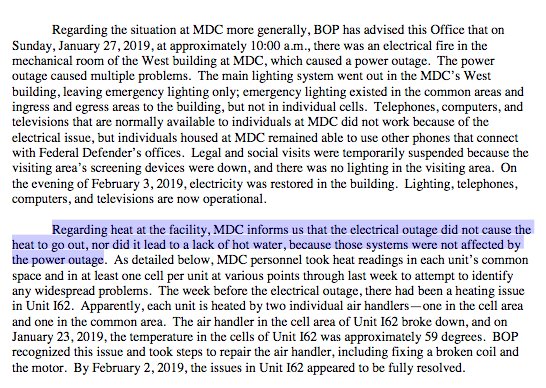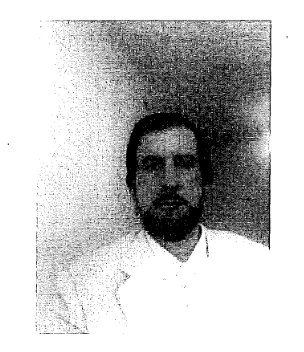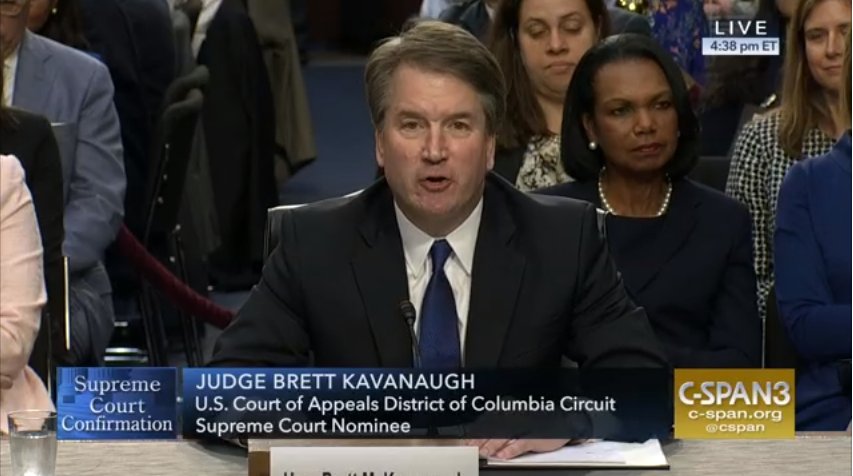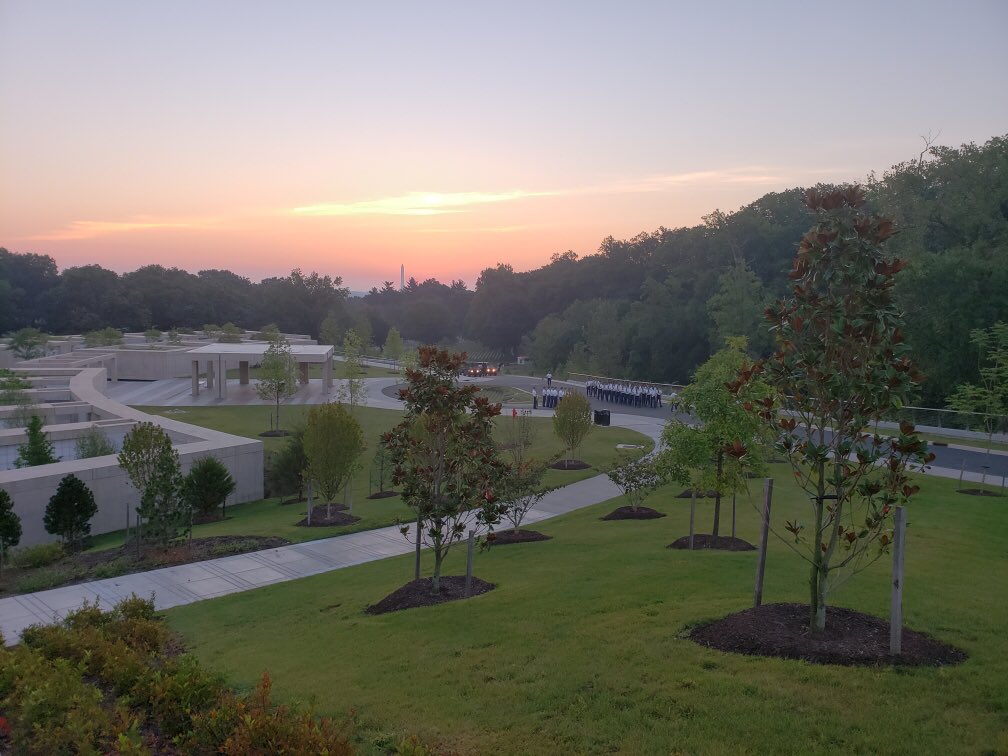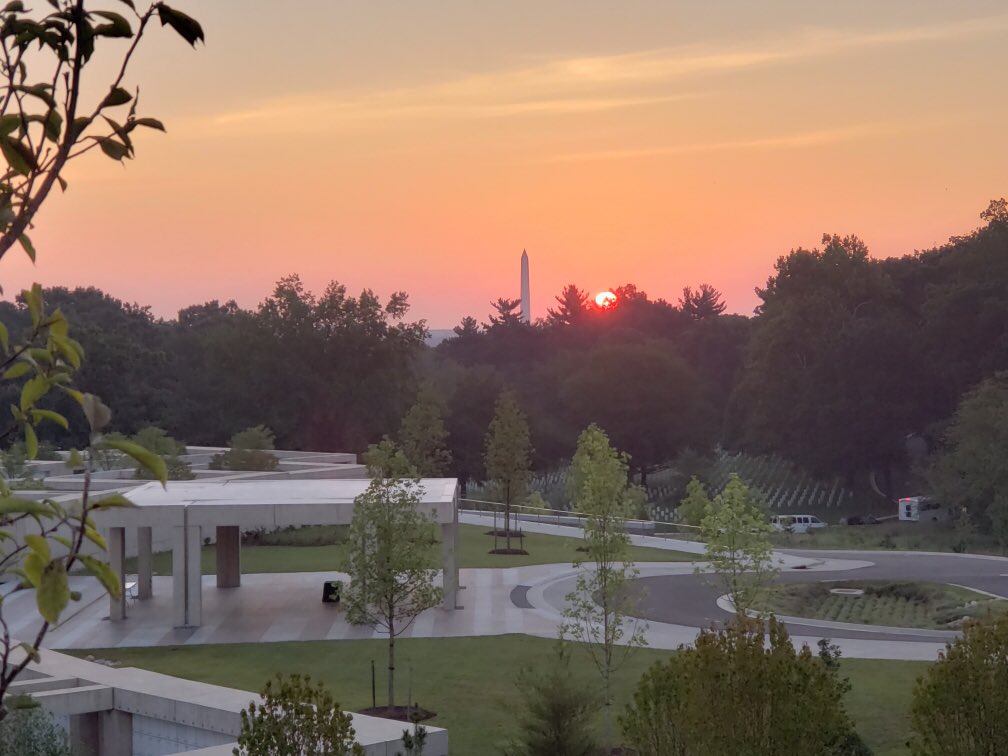I'll be live-tweeting a hearing today at 11 a.m. in the case of #MDCBrooklyn inmate Jose Segura-Genao, whose attorney first complained about the power outage there on Jan. 31.
Here's a snippet from the letter.
Background: courthousenews.com/lawyers-blast-…
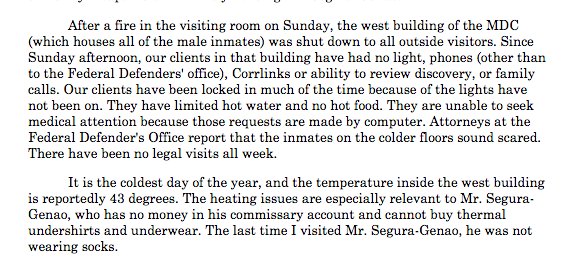
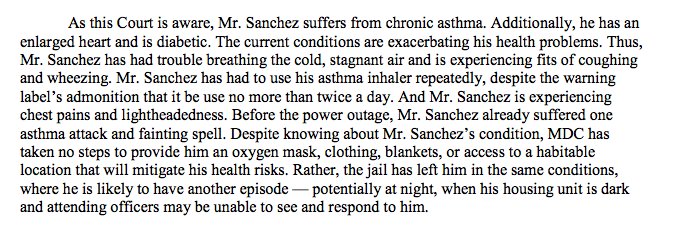
She also allowed the defense to call witnesses about the conditions at MDC.
Swiftly and unceremoniously denied. documentcloud.org/documents/5725…
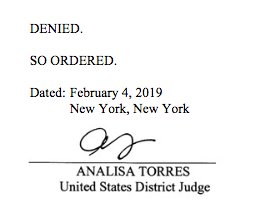
General bustle in the courtroom in the lead-up to the hearing, which is about to begin.
Standby.
The judge enters.
"Good morning."
Ezra Spilke represents Mr. Segura-Genao, along with @GideonOliver and Sarah Kunstler.
Segura-Genao entered.
"Today, I will hear testimony from individuals who have experienced the conditions at MDC firsthand."
"Today, after this hearing is over, I will be visiting MDC."
"Over the past week, we've experienced some heat issues as well as we had no electricity."
She says that MDC experienced "very cold temperatures" about "a week" before the fire.
An exchange about the lights-out:
Q: What kind of working conditions did that create for staff?
A: For me, it felt like it created a dangerous environment.
After Kunstler asked if the electricity issues put lives at risk in MDC, the government objected. Sustained.
Witness: I can't recall.
Asked about this remark, Barnwell stands by it: "Absolutely."
"I'm thinking that if the media didn't come, we'd still be in the same situation," she added.
A: Yes.
Asked to elaborate, Barnwell says there's leaks "throughout the institution" and "massive floods."
Q: While the COs had access to hats and gloves and coats, did the inmates have access to extra materials?
Barnwell replies they had blankets but no extra materials.
Gov't cross-ex starts.
Barnwell's testimony ends.
Ezra Spilke asks him whether there was a problem with the heat recently at MDC.
"Correct," Maffeo says, estimating that it started a week or two before the fire.
A: I became aware of the problem on Jan. 21.
Spilke noticed that the problematic units had to be taken out and asks whether there was a contingency plan for heating cells.
Maffeo: On the 21st? I don't believe we did it on the 21st.
Torres presses on whether he did it after. The gov't offers a list of temperatures Maffeo recorded after that.
He's given the documents.
"These are temperature readings that we took throughout the institution," he says.
"No, we took the temperature readings because we knew we were heading to the cold weather," he says.
The staffer "told me that there was a fire in that area of the building, on the first floor, and I told him to contact the operations lieutenant," he said.
Q: What happened next?
A: He says that FDNY was onsite when he arrived and extinguished the fire and the power was "knocked off service."
"I knew it wasn't going to be a quick, overnight, return to service type of repair," he testified.
Maffeo said that the inmate and staff phones are two separate systems: for security and "monitoring" reasons.
The power knocked out the monitored lines.
A: Of course.
He says "Priority 1" and "Priority 2" equipment was powered through "the whole incident."
I'll try to define that jargon as soon as I receive clarification.
Inmate computers and phones are "Priority 3" equipment.
Q: Is there a priority below "Priority 3"?
Maffeo replies that no, that is the lowest.
AUSA Portlock tries to admit the temperature readings.
Spilke doesn't object.
It's admitted.
Spilke asks about whether Maffeo or anyone on his staff took the temperature of the medical records area.
A: Yes.
Q: Is that reflected in your notes?
A: Yes.
Maffeo says he doesn't know and only started recording time on Feb. 1.
Maffeo: "We used a laser point and aim measuring gun."
Spilke: "You mean like this?"
Spilke brandishes the equipment in the air and hands it to the witness.
A: No, it was not.
Maffeo points the laser gun to courtroom wall and takes a reading: 73.7.
Spilke asks whether the temperature varies depending on where you point in the room.
Q: If an inmate got out of bed, might that affect the reading?
Maffeo says it might "slightly."
Maffeo agrees.
Redirect ends, and the next witness is coming up: Miguel Cruz.
She wants to limit cross-examination to the conditions at MDC, not criminal history or pending cases.
Cruz testified that was released at the end of January.
Kunstler pivots to the Jan. 27, the day of the fire.
"I couldn't sleep because it was cold."
He said that he was sleeping in his jumpsuit. He was completely dressed and had two pairs of socks on.
A: Two sandwiches. A bologna and cheese and another.
Q: Did you receive hot meals?
A: No.
"It was always dark," he says.
Q: Even during the day.
Yes, he replies.
"It's horrible. It's horrible. I don't like it."
Q: Did you get clean laundry during this time?
A: No.
Cruz testifies that he could take a shower every 72 hours.
"I wasn't going to take a shower in frozen water," he says.
Cruz replies that there was still no hot water.
Q: What about people with special diets?
A: No, there weren't getting nothing.
A Hindu inmate only had water and bread during that time, Cruz says.
A: No.
"It was stressful," he said. "They're the only people who make me feel comfortable."
A: They ain't let us go outside. They didn't want us to go out in the yard.
Describing his release, Cruz says: "I was surprised. I was crying."
Torres abruptly interrupts. Times up. No cross-ex. No redirect. Next witness.
She made a video that Spilke offers as an exhibit.
Torres: She's hearing a noise and now, she's essentially guessing how the noise was produced.
Q: How did it make you feel?
Objection. Overruled.
A: It was shocking to hear. It's not a sound that you normally hear... To me as a social worker... it sounded like a cry for help.
Direct examination ends. No cross examination. Next witness.
"I remember it was supposed to be the coldest day of the year," Bencibi says, not recalling the date.
Q: Was that in January?
A: Yes.
Q: Did that predate the fire at the facility?
A: Yes.
She testifies that it became a problem again on Martin Luther King Day.
She said that other staffers used a space heater, but she did not have one.
Torres asks if there were "physical manifestations" of inmates being cold.
Bencebi replies that she didn't interact with the inmates on those days.
"No," Bencebi replies.
A: Yes.
A: In their cells, on the 4th floor.
A: No.
Same with space heaters.
Torres: You were wearing more clothing than they were, was that correct?
A: I couldn't say.
She says she didn't observe.
A: I would say, no. It isn't a safe situation for the staff.
She testifies that the government shutdown aggravated the situation.
"I have no idea," Bencebi says.
Q: The problems with the electricity started a couple of weeks before [the fire]?
Sanon replies that's correct.
"From what I was told, they told me the entire building was affected at that time," Sanon says.
Q: That includes staff-only floors?
A: That includes everybody.
A: Yes.
Torres: What were there specific complaints?
Sanon replies lighting was a big one, because it poses a security issue and impeded their ability to detect contraband.
A: Yes.
A: Yes, I did.
Q: And, did anything happen?
Sanon says that management told him that they were going to take care of it.
A: No, I was not.
Sanon describes his tours with Congress officials and others.
"The institution has heat," Sanon says.
He testifies that this was the first time he observed heating problems at MDC.
Spilke calls the next witness: New York City Council member @JumaaneWilliams.
A: Yes.
"We heard some news that things weren't going well there," Williams said, adding later: "We went down there to check it out for ourselves."
Torres: What day did you visit?
A: Saturday, [Feburary] 2nd.
He said the inmates had been on lockdown.
"It was pretty astonishing, actually," he said. "There were people we were trying to connected to get medical attention."
One had an eye infection.
He said that the blankets were not distributed; there was no emergency plan, and "there was no plan to create a plan."
Hundreds of blankets and portable generators, Williams replies.
Williams testifies that MDC officials seemed to be annoyed that he and other electeds were there and cared about the prisoners.
He said that he was there in the day, but the lights were off. "At least two of the cells" had inadequate heat by the time they arrived.
Some of the inmates blocked the vents to prevent cold air from coming in, he says.
Direct examination ends. Again, no cross-ex. Next witness.
"It was hard on me because it was dark," he said. "It was cold. I was nervous."
He said that the temperature in his cell was between 30 to 40 degrees.
The CO was bundled up. Murray was not, he said.
"I had nothing to bundle up [in]," he says.
A: Yes.
Q: What kind of air was that?
A: Cold air.
He said last saw his lawyer at the beginning of January, and he's about to go to trial. He says it's part of the reason he requested treatment.
A: The food was cold when it came to my cell.
Q: Do you feel ready for trial in your case, sir?
A: No, I don't.
Kunstler: No further questions.
No cross-examination by the government.
Murray steps down.
His name is Elezar Garcia (sp?).
Thermal underwear can only be purchased through commissary, Spilke notes.
"Intelligence?" Torres interrupts.
Garcia gives the example of an inmate transferred from another jail. The computer outage would prevent them of learning about that prisoner.
No redirect.
Next witness: Dierdre Dionysia von Dornham, attorney-in-charge at the Federal Defenders of New York
Q: How did this fire affect your ability to do your job.
Von Dornum replies in "several ways," starting with attorney visits being curtailed.
"We were hearing truly alarmed reports," she says.
Seeking more information, Von Dornum said, she contacted the BOP.
"The response we got was, none, or that heating has not been affected," she said.
"People were begging me to call their lawyers," she continued later. "So I have personal knowledge that what the warden said was false."
She says the statement that "inmates have not been confined to their cells" and that they were allowed recreational activity is "false."
She recalls it being "quite cold" when she visited.
"They would get on the phone and beg," Von Dornum said.
"They were expressing real terror in a way that I haven't heard."
"There was not hot water in some of the showers," she said.
When she visited, she recalled them saying: "Today is the first day" they received hot food.
She said an inmate reported losing 5 or 6 lbs in the past few days, & was denied treatment.
Describing the client with colitis, the bloody sheets and the open wound, Von Dornum said that an MDC official claimed he was receiving treatment. He still had that open wound.
So Von Dornum says he will not testify.
Q: Do these temperature readings comport with your experience at the units?
Von Dornum said that she was not able to go into some of the cells, but that there was a "great temperature variation."
At Guantanamo, there is usually one reporter, who typically live-tweets like this for military commission hearings. That's Carol Rosenberg, whom McClatchy offered a buyout.
Protect journalism.
Now, back to the feed.
There's a social phone that's a recorded phone, which inmates use by purchasing time from the commissary.
"Families were able to visit for the first time last night, which was great," she said.
Von Dornum said that she arrived at the same time as Rep. @NydiaVelazquez, but that MDC officials would not let them take tour around together.
Those are the so-called "special housing units" commonly known as "the hole" or solitary confinement.
Von Dornum says two reasons: The congresswoman's Spanish is stronger than hers, and Von Dornum knows how to navigate the prison and push back against official denials of access.
Judge Torres asks the witness what relief she wants.
"The biggest problem here is the lack of transparency," she says, and Von Dornum wants her help with that.
"I do think that if the guards knew, if the management knew, that people could show up at any time," Von Dornum says, things might change.
She requests putting a special master in place.
10 minute recess. Possible cross-examination ahead after that.
Q: Were you aware that the heat was generally back on?
A: Yes, I heard there was some inconsistency.
But yes, she adds.
Kunstler back up for redirect.
One of the units, he said, felt "cooler."
Ross: The correctional officers in the lobby had winter coats on.
Ross: The inmates within the cells. Some had T-shirts on... Some had blankets over their heads.
Torres: Do you have any other observations concerning the temperature and the treatment of the inmate?
Ross says the temperature was "fine," but medical treatment "concerned me the most."
Ross says he wore an overcoat over his clothing.
Q: Are you wearing an overcoat today?
A: No.
He wore a suit.
"We may be resuming later," she adds.
One request seeking judicial notice of Weather Channel data on the temperatures in NYC during the relevant time period.
Story TK.
